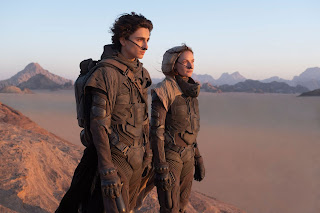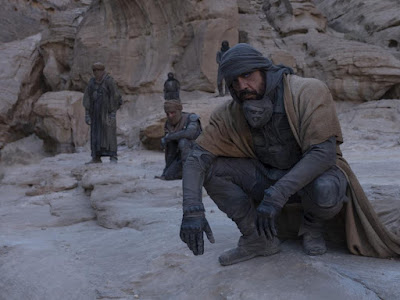About a fortnight ago in the run-up to the 2021 Denis Villeneuve version of 'Dune,' I decided to revisit David Lynch's 1984 movie of Frank Herbert's sci-fi novel.
A spectacular flop, I remembered it as being bad.
I just forgot how bad.
Ham acting (I'm looking at you Brad Dourif and Patrick Stewart), ropey effects, Sting's cosmic underpants and a soundtrack featuring Toto were just some of its lowlights.
Lynch, of course, wasn't the first choice to direct the film.
David Lean had originally been attached to the project and then Alejandro Jodorowsky who wanted to cast Salvador Dali, Orson Welles and Mick Jagger.
Ridley Scott seemed the natural choice when Dino de Laurentis acquired the rights but after working on three drafts of the script, he bailed.
Lynch's film with Kyle McLachlan, Francesca Annis, Max Von Sydow and Dean Stockwell somehow came surprisingly close to making back its $40 million budget despite being hammered by the critics.
John Harrison attempted a three part Sci-Fi Channel miniseries in 2000, with William Hurt and Ian McNeice which made a better fist of adapting the novel but still fell way short of expectations.
After Peter Berg and Pierre Morel failed to get movie adaptations off the ground, Denis Villeneuve announced plans to bring the tale back to the big screen on the back of his stunning, critically acclaimed movies 'Arrival' and 'Blade Runner 2049'.
Even though neither was a major box office success, Villeneuve was pretty much the director you'd pick to take on the challenge of adapting a novel that many in the movie industry have come to believe is unfilmable.
And boy, does he deliver in spades.
Adapted by Villeneuve, Eric Roth and Jon Spaihts, there is a lot of information to absorb in Herbert's novel about the politics of the intergalactic empire it depicts.
However Villeneuve, his writers, cast and crew impart it all with great style.
'Dune' is mostly set in Arrakis, a desert planet that has been colonised by the House Harkonnen, a bald headed race of heavily armed warriors who have profited off mining spice - a substance that is critical for interstellar travel and which also boosts human vitality.
Ordered by the Padishah Emperor Shaddam IV to relinquish their fiefdom over Arrakis, Dave Bautista's Glossu Rabban rants and rages to his uncle, Stellan Skarsgard's bloated Baron Vladimir Harkonnen about them having to hand over control of the planet.
They nevertheless withdraw.
The Emperor has assigned control of Arrakis instead to Oscar Isaac's Duke Leto Atreides whose House Atreides is a rival of the Harkonnen.
However it soon becomes clear that running Arrakis is far from a cakewalk.
The native people of the planet, the Fremen, led by Javier Bardem's Stilgar, are a rough people, wary of imperial rulers.
The desert is riddled with giant sandworms that gobble up humans and destroy mining equipment.
Arriving on Arrakis from the ocean planet Atreides with his son, Timothee Chalamet's Paul, Paul's unmarried mother Rebecca Ferguson's Lady Jessica and Josh Brolin's weapons master Gurney Halleck, he realises from the state of the mining equipment that his House may have been set up to fail.
The locals, however, are fascinated by Paul and whether he will turn out to be the great warrior leader from outside Arrakis according to a prophecy.
While Leto is keen to school Paul in affairs of state and has Gurney train him in the art of combat, Lady Jessica explores whether he has other supernatural gifts like the ability to mesmerise his enemies by changing the pitch of his voice.
An encounter with Charlotte Rampling's leader of the Bene Gesserit sisterhood and a key adviser to the Emperor, Gaius Helen Mohiam tests Paul' s emotional and mental fortitude and he passes.
However Gaius Helen Mohiam berates Lady Jessica, an acolyte of the sisterhood, for failing to bear a daughter as instructed.
Paul is beset by vivid dreams involving the Fremen, Zendaya's warrior girl Chani and premonitions of him being stabbed, in combat and of a bloody sword.
Enjoying a close friendship with Jason Momoa's warrior Duncan Idaho who has made contact with the Fremen, Paul is keen to fly out with him to the desert.
Leto has also told the Fremen leader Stilgar that he wants to peacefully co-exist with their race on Arrakis - a message that is received gruffly and sceptically.
The Harkonnen, however, still have designs on regaining Arrakis and when Leto is betrayed by a member of his team, it sets in train a dangerous desert trek that will see Paul and Lady Jessica trying to flee the enemy and avoid being gobbled up by the sandworms.
When trying to summarise in a review a plot as complex and detailed as 'Dune's,' with all the its ridiculous names for its characters, planets and races, there's always a risk the film just sounds silly.
However Villeneuve's version is anything but silly.
As he has repeatedly demonstrated over the course of his career, few directors can match him for atmosphere.
Villeneuve's work with the great cinematographer Roger Deakins has conjured up some of the most jaw dropping images in cinema in recent times from the nighttime assassins hunting the drug cartels in 'Sicario' to the giant, pill shaped spaceship in 'Arrival' to the amber sandstorms and neon cityscapes of 'Blade Runner 2049'.
He's at it again in 'Dune' but this time with the help of Australian cinematographer Greig Fraser, a 264 strong visual effects team led by Paul Lambert, Patrice Vermette's production design, Jacqueline West and Bob Morgan's costume design, Phil Barrie's 32 strong sound effects team and Joe Walker's assured film editing.
All of these component parts click into gear to create a visual and sonic feast, propelled by composer Hans Zimmer's magnificent score.
Rarely does a score play as significant a part in generating atmosphere but the German composer uses bagpipes, choirs, electric guitars and electric cello, the Armenian duduk and most synthesisers to stunning effect to give Arrakis an otherwordly feel.
Villeneuve and his crew comfortably embrace the chance to explore the vastness of Arrakis' desert and imbue the film with Eastern and Arabic influences - so much so that it is impossible to think of the planet's colonisation without comparing it to recent occupations in Iraq, Afghanistan and Syria.
Images of the desert rippling and exploding as sandworms or camouflaged warriors emerge or of mosquito winged helicopters imprint themselves on your brain.
However like Christopher Nolan's films, there is always the risk that in delivering the stunning detail, Villeneuve loses grip of the plot.
Villeneuve, Roth and Spaihts do a really impressive job wading through Herbert's background material about the politics of the empire and letting the power of the image and of sound envelope and drive the story forward.
Ill suited to a sci-fi movie of its scale, Lynch struggled to bring Herbert's novel to life and as a result his cast drowned.
Here the cast seem perfectly at ease, with Isaac, Ferguson, Brolin, Bardem and, surprisingly, Jason Momoa taking the acting honours with assured, charismatic performances.
Chalamet is well cast as Paul.
There's a real risk he could come across as too slight to convince as a young prince turned psychically gifted warrior but he gets the pitch just right.
Zendaya brings an enigmatic charm to her part as the warrior girl of Paul's dreams.
A barely recognisable Skarsgard and Bautista gamely take on the opportunity to be villains, without ever succumbing to the chance to ham it up.
Charlotte Rampling, Stephen McKinley Henderson as a Atreides general, Chang Chen as their medic, Babs Olusanmokun as the Freman warrior Jamis and Sharon Duncan-Brewster as the imperial ecologist Dr Liet-Kynea also make significant contributions.
Some audiences weaned on a diet of crash, bang, wallop blockbusters may find the pace of Villeneuve's 'Dune' too meticulous, too deliberate for their taste.
However there is a real sense that Villeneuve and his fellow writers are building up to a second film and creating a sense of expectation towards an epic confrontation in that film.
While it has a running time that is actually shorter than 'No Time to Die', it does feel longer but not in a mind numbing way.
Some viewers will undoubtedly be seduced by its scale and spectacle.
They will also be mesmerised by its mix of ancient, Islamic and Hebrew mystery.
While you should always choose cinema first over streaming, if there is one film you should choose in 2021 to see in a multiplex it should be this.
A large screen, an epic sound system and the company of strangers is the right way to see Villeneuve's epic, so you can properly savour it.
Drawing upon influences like Lean's desert epic 'Lawrence of Arabia,' George Lucas' 'Star Wars, Martin Scorsese's 'The Last Temptation of Christ' and Scott's 'Blade Runner,' there are probably only two filmmakers who could have taken on a project as epic and complex as 'Dune'.
One is Christopher Nolan and the other is Denis Villeneuve.
With 'Dune,' Villeneuve shows he is the right choice.
It feels like the film the Canadian was born to make.
And now he has done that so breathtakingly, roll on Part Two.
('Dune' opened in US, UK and Irish cinemas on October 22, 2021)















Comments
Post a Comment